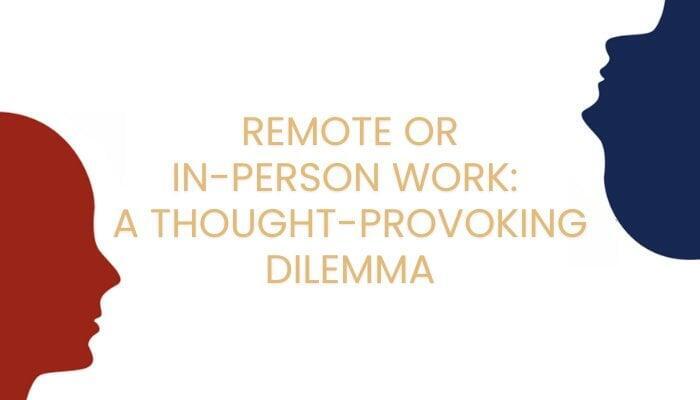
In a world reshaped by the COVID-19 pandemic, the conversation surrounding the return to office work has intensified. While some companies are issuing stringent return mandates, others are adopting more flexible approaches. Striking the right balance between what the corporations demand and what employees need has become the focal point of this debate.
This article delves into the complexities of this issue, going beyond the surface to consider the broader implications of the remote work revolution.
CEO Ultimatums vs. Employee Well-being
The return to office mandates, as witnessed in recent times, have stirred mixed reactions among employees. Companies like Amazon, Google, and Publicis* have taken a hardline stance, threatening disciplinary action for non-compliance. However, this approach often leads to discontent among employees who have grown accustomed to remote work.
This discord highlights the need for a more empathetic and flexible approach. The transition back to the office should not only consider corporate objectives but also prioritize employee well-being. Companies like Perkbox and EMCOR UK* are adjusting their strategies, recognizing that overly rigid mandates can alienate workers. By adopting a more worker-led, flexible approach, these companies have found that employees are more willing to adhere to office policies without feeling like they are being punished.
Transitioning from Ultimatums to Incentives
In the face of resistance to office returns, some companies are finding creative ways to incentivize employees. This approach, as discussed in the articles, acknowledges that workers need compelling reasons to return to the office willingly.
Companies like Perkbox* are offering incentives such as rewards points for in-office employees. This approach is designed not as a bribe but as a way to make the return to the office more appealing. It includes perks like lunch subsidies, grocery allowances, or even subscriptions, demonstrating an understanding of employees' needs and desires.
Embracing a Hybrid Model
One significant shift, as noted in the articles, is the transition from flexible hybrid work arrangements to more structured office schedules. Major corporations like Starbucks, Disney, and Google* are moving toward set days when teams are expected to be in the office. This change signals a departure from the initial soft reopening strategies and a recognition that a more structured approach might be necessary to meet corporate goals.
Zoom*, a company that thrived during the remote work era, has also adapted by introducing a structured hybrid work schedule. Employees living near an office are expected to be in at least twice a week. This strategic shift aligns with the changing seasons, emphasizing the return to a more regular work schedule, as mentioned in the articles.
Beyond the Surface
While the return to office is often framed as a corporate decision, it carries profound implications that extend far beyond the boardroom. Remote work presents an opportunity to reevaluate our impact on the environment. By reducing the need for large office spaces, we can decrease energy consumption and lower greenhouse gas emissions, contributing to a more sustainable future.
On a societal level, remote work has the potential to alleviate the housing crisis in major cities. The shift away from crowded urban centers can reduce housing costs and ease the stress associated with congested living spaces. It enables individuals to reclaim their time and reduce the stress of daily commutes, ultimately improving overall well-being.
Moreover, remote work fosters inclusion by removing physical barriers present in traditional office spaces. Individuals with disabilities, whether visible or invisible, can work in environments that accommodate their specific needs. This inclusivity extends to those with mobility challenges, sensory sensitivities, or mental health concerns, ensuring that no one is left behind in the workforce.
Can we use this moment of transition to create a Thought-Provoking Revolution for the nature of work?
As companies grapple with the return to office, it's essential to look beyond the immediate corporate implications. The remote work revolution carries profound social, environmental, well-being, and inclusion ramifications. Balancing the demands of corporations with the broader societal impact is no simple task.
As we navigate the path forward, we must consider the interconnectedness of our choices. Remote work is not merely a corporate strategy; it's a transformation with far-reaching consequences. By embracing flexibility, adopting worker-led approaches, and providing enticing incentives, we can create a harmonious transition back to the office while recognizing the broader implications of our decisions. In this rapidly changing world, the remote work revolution challenges us to think critically, both at macro and micro levels, about the future of work and the world we want to shape.
The Remote Work Revolution: Beyond Personal and Corporate Reasons
I wonder if there is there another way to approach to this dilemma facing corporations and employees. Can this be a start of a paradigm shift towards how we as a society view work and workplaces?
Bridging Personal and Societal Benefits
I urge both employers and employee to consider having an open dialogue about this contentious topic. To jumpstart this discussion, here are a few questions to consider:
- How does remote work contribute to individual well-being, and what societal benefits can be derived from a happier, less stressed workforce?
- What environmental implications result from reduced office space needs, and how do these align with broader sustainability goals for our planet?
- In what ways does remote work alleviate the social challenges of crowded urban centers, and how can this lead to more balanced urban development?
Balancing Corporate Objectives and Societal Well-being
Corporations can use this transition as an opportunity to explore their social responsibility, environmental sustainability and inclusion initiatives as it relates to how work is performed in-person or remotely. Here are a few questions to get thoughts rolling:
- How can companies strike a balance between achieving corporate goals and preserving employee well-being and environmental benefits associated with remote work?
- What strategies can organizations employ to incentivize employees to return to the office while ensuring that the broader societal advantages are not lost?
- Are there opportunities for companies to actively contribute to societal well-being and environmental sustainability through their remote work policies?
The Road Ahead: Shaping Our Future Society
To take a positive step forward it's essential to bridge the gap between personal, corporate, and societal interests. The remote work revolution carries profound implications for our future society, influencing well-being, sustainability, and urban development. Balancing corporate objectives with broader societal benefits is no simple task.
The choices we make today will shape the kind of society and world we leave for future generations. Remote work offers opportunities to enhance individual lives, reduce our environmental footprint, and promote more balanced and inclusive urban centers. By fostering open dialogue and considering the macro-level implications, we can make informed decisions that contribute to a more harmonious and sustainable future society.
Let us get beyond the reasons of convenience and profits as think critically about the societal impact of remote work and how it challenges us to bridge the gap between personal, corporate, and broader societal interests. In doing so, we can collectively shape a future society that reflects values and aspirations.
Facts *'The CEOs drawing a hard line on return-to-office policies' by By Alex Christian published 5th September, 2023.
*'The perks and incentives coaxing workers back to the office' by By Sophia Epstein published 7th September, 2023.

